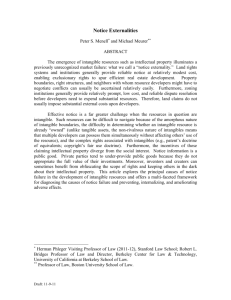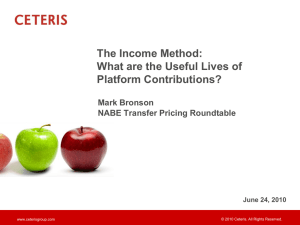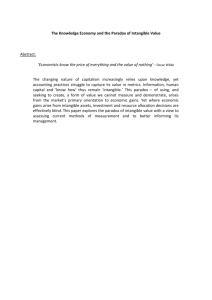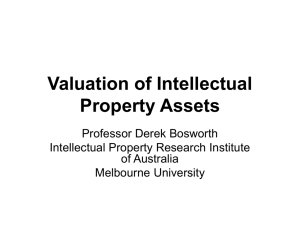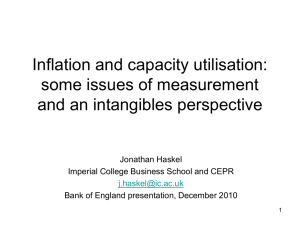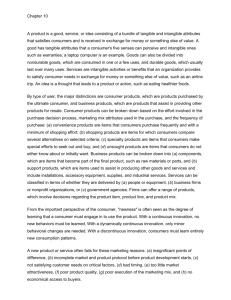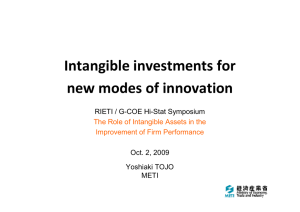intangible personal property - Montana Taxpayers Association
advertisement
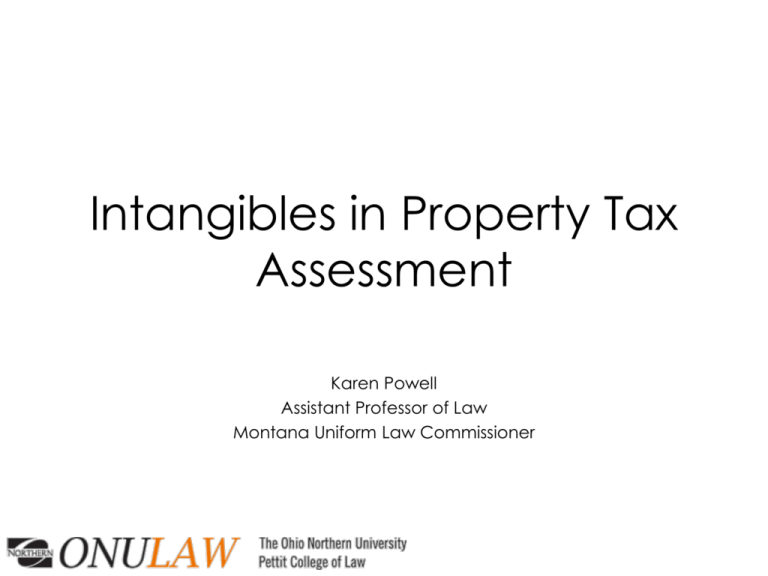
Intangibles in Property Tax Assessment Karen Powell Assistant Professor of Law Montana Uniform Law Commissioner Montana Constitution Article VIII -- REVENUE AND FINANCE Section 3. Property tax administration. The state shall appraise, assess, and equalize the valuation of all property which is to be taxed in the manner provided by law. Statute Eliminating Intangibles From Tax 15-6-218. Intangible personal property exemption. (1) Intangible personal property is exempt from taxation. (2) For the purposes of this section, "intangible personal property" means personal property that is not tangible personal property and that: (a) has no intrinsic value but is the representative or evidence of value, including but not limited to certificates of stock, bonds, promissory notes, licenses, copyrights, patents, trademarks, contracts, software, and franchises; or (b) lacks physical existence, including but not limited to goodwill. (3) To the extent that the unit value of centrally assessed property includes intangible personal property, that value must be removed from the unit value. History: En. Sec. 1, Ch. 583, L. 1999; amd. Sec. 1, Ch. 318, L. 2005. Centrally Assessed Property • Property in Montana is taxed on the basis of fair market value. Section 15-8-111, MCA, provides in part that: • (1) All taxable property must be assessed at 100% of its market value except as otherwise provided. • (2) (a) Market value is the value at which property would change hands between a willing buyer and a willing seller, neither being under any compulsion to buy or to sell and both having reasonable knowledge of relevant facts . . . . • In Montana, the valuation of property is typically described as being locally assessed or centrally assessed. In Montana, the Department of Revenue centrally assesses property described in 15-23-101, MCA, using the unit value method. • Industrial property is assessed by Department appraisers in Helena in the county in which it is located. Comparing other States • Trends: most states using unit value methods also exempt intangibles • Litigation is prevalent; evidentiary issues abound • Intangibles and “Enhancement” Most Developed Intangible Law • California Constitution prohibits taxation of Intangibles. See also section 212, CA statutes • California statute Section 110(e), the Board may “assum[e] the presence of intangible assets or rights necessary to put the taxable property to beneficial or productive use.” • Elk Hills Power v. CA Bd of Equalization, 304 P.3d 1052 (2013) Representative States using Unit Value and Exempting Intangibles • AZ, NM, ID, OR, UT: see 2011 report • UT: intangible vs. enhancement value Beaver Co. v. Wiltel, 995 P.2d 602 (2010); T-mobile USA v. UT Tax Cmmn, 254 P.3d 752 (2011) • WY: enhancement; proof RT Comm. v. WY, 11P.3d 915 (2000); Airtouch Comm. v. DOR, 763 P.3d 342 (2003) Policy Considerations • Fairness, and Equity Within Tax Classes, Equity Among All Taxpayers • Stability for taxpayers, local governments • Factors relating to region • Federal Preemption (4R legislation) Possible Solutions Implementation, in order of challenge 1. 2. 3. 4. 5. 6. Timing of filing, and required materials Format of DOR appraisal Legislation to set framework for valuation IRC Section 197 Uniform property tax statutes Include intangibles and change tax rate
